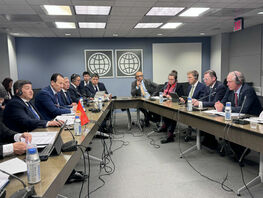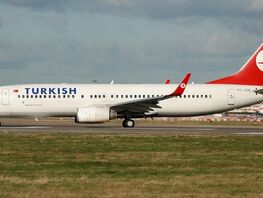As part of the provision of humanitarian assistance, a group of medical workers has arrived in Kyrgyzstan from the Russian Federation on July 23. These are surgeons, cardiologists, therapists, pediatricians, anesthesiologists-resuscitators, infectious disease specialists and other specialists with experience in treating patients with coronavirus infection.
The health workers were divided into five teams. The head of the group, Deputy Minister of Health of the Republic of Bashkortostan, Yevgeny Kustov, told 24.kg news agency about their work.
— You have already worked at our hospitals for a week. Can you share any observations?
— You have very good doctors in your republic, professional, selfless. We consider them as the heroes of the present.
The situation is quite difficult. But I am sure that everything that is being carried out at the level of the Ministry of Health, Government and medical organizations will allow us to cope with the challenge in the near future.
We will stay here for a month. Two teams initially worked in Osh city. One of them is currently there, the other has left for Jalal-Abad. The third has worked in Tokmak, and returned to Bishkek and, most likely, will work at the Republican Clinical Infectious Diseases Hospital. Two more brigades are in Karakol and Naryn region. You have a quite large number of infectious diseases hospitals; we have been tasked to cover as many of them as possible.
Members of the Russian teams have examined 100 percent of patients in those 24-hour hospitals where we have already been.
Based on the examination and analysis of the data, we recommend and adjust the treatment regimens.
Our doctors, like yours, work in the red zones. We come in, look, provide advice and methodological assistance, if necessary. If there is a need in a hospital, we work for a week or two, and we can stay for the whole month. But if we see that there are enough doctors and all patients have been examined, then by the decision of the administration and the Ministry of Health of the Kyrgyz Republic, we move to another hospital.
— Can you make any comment on the work of our doctors?
There is no comment. I can only praise. They have a lot of work. They heroically fulfill it 100 percent. They are great fellows.
Yevgeny Kustov
We discuss the issues arising during treatment together, we bring our experience and make a common decision on how to treat this or that patient. The level of our influence is minimal.
— Do you promote your medicines?
— We provide advisory and methodological assistance. On behalf of our entire Russian delegation, I can say one thing.
We did not insist, did not coerce, and even did not impose our protocol and treatment regimens or any specific antibacterial, antiviral and other drugs.
Yevgeny Kustov
We have not done it and we believe that your specialists, the scientific community and the Ministry of Health will absolutely independently decide on the protocols, and clinical guidelines, and everything else.
The most we do is to tell you about our personal experience and suggest you simply consider it.
Our protocols are freely available and your specialists can easily familiarize themselves with how the treatment is carried out in our country, and take something useful for themselves, if they deem it necessary.
— Did you bring any medicines with you?
— No, our plane did not bring any drugs. I repeat once again: we do not use unapproved medicines and medical devices.
We have brought a ventilator and mobile X-ray units. The list of all humanitarian aid provided by the Russian Federation to Kyrgyzstan is published on official resources.
— You have said that the situation is difficult. What needs to be done to stabilize it?
— First, continue treatment. And secondly, to reduce the risk of infection of doctors with infectious diseases.
It is necessary to organize such working conditions so that doctors do not go out of order, to protect the medical staff.
In addition, as the flow of patients decreases, I would recommend transferring them from day patient hospitals to round the clock ones, or arrange treatment at home.
Patients with an infectious profile should be treated in specialized hospitals. Our patients with mild form of the disease were treated at home, with moderate and severe — in round-the-clock hospitals.
— There are still debates whether the idea of opening day patient hospitals in non-medical buildings was correct.
— We understand why such a decision was made — there was a massive flow of patients. But now, with a decrease in the number of patients, it is still necessary to transfer them or organize treatment at home.
— How to protect health workers?
— It is important to arrange the system of anti-epidemic measures. This is exactly what we are doing now in every medical institution where we are. We help to build the right system.
This is the separation of zones, flows of movement of patients and material values, correct operation of the gateways for the entry and exit of employees, where they take off their personal protective equipment.
Compliance with these measures reduces the risk of infection of medical workers working in the red zone to almost zero.
— It turns out that we had serious problems with this, given the high percentage of doctors infected?
— No, the work has been arranged. Almost every medical organization has infection control. But, based on our experience, we propose to introduce certain things to better protect your health workers.






